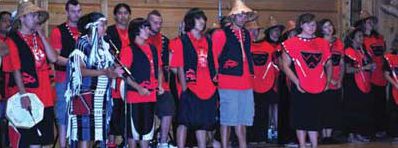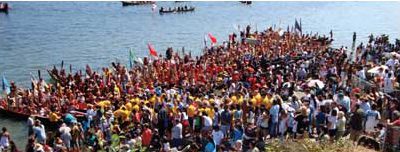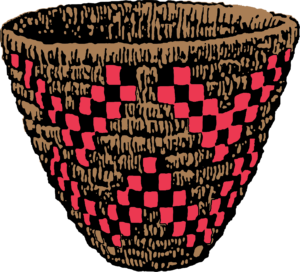2009 Tribal Journey “Paddle to Suquamish”
By Diana Pickernell and Fred Shortman
The 2009 Paddle to Suquamish marked the 20th anniversary for the tribal canoe journeys. Through many challenges and much determination, the canoe journeys survived. Many of our ancestors travelled though the Puget Sound for many reasons: trading, hunting, fishing and ceremonies (weddings, traditional naming ceremonies, potlatches, etc.). They shared their songs and traded along the way.
Twenty years ago, the tribal canoe journeys were revived by Emmitt Oliver in the 1989 Paddle to Seattle. In the first journey, there were only nine canoes that started out. This year’s journey brought in over 90 canoes to the Suquamish Tribe. Who would have dreamed that this canoe journey tradition would grow so large!

In late May, Chehalis tribal youth participated in a practice pull from Solo Point to Owens Beach with Squaxin, Nisqually, Puyallup, Muckleshoot, and Cowlitz tribal canoes.
The Chehalis Canoe Family was honored to be a part of this year’s journey. We participated in teaching, preserving, and connecting with our culture, learning the history of our ancestors, sharing and carrying on native traditions. Being able to travel with our canoe is the most honorable way to honor our ancestors and to practice our culture in the same way that our ancestors lived.
This is the third year the Chehalis Canoe Family has participated in the tribal canoe journey. There were over 50 tribal and community members who lived and travelled together, some travelling with our canoe, “Tu-lap ti weah”, and others supporting us by travelling on land. Twenty-five youth, 10 elders and 30 adults travelled from the Lummi Tribe to the Suquamish Tribe. At times, our family grew to over 80 as tribal elders and community members visited us at our campsites, or came to witness protocols along the journey.
The heat definitely impacted the journey this year, with temperatures going above 100 degrees. Staying hydrated, and protecting everyone from the sun was definitely a challenge. Our support boat carried extra water to assist in accomplishing this task. As canoe families arrived, and awaited permission to land, the hosting tribes provided water for the pullers and skippers.

The cold water training was intense as the canoe was flipped over and pullers worked in unison following the skippers orders to safely get into the canoe.
The Chehalis Canoe Family worked very, very hard this year ensuring that this year’s journey would be a success. We participated in many fundraisers which our youth had a huge part in. We had numerous meetings to learn to drum, sing and dance. Many of the songs that were learned are songs that are being shared by other tribes and families. The dinner song we learned at this year’s drum practice was a great addition.
Each person was responsible for decorating their own regalia. There wasn’t a moment lost, as you could see elders, youth, and adults working on their Coastal Salish regalia. Many thanks go to Trudy Marcelley, Dianne Devlin, Sally Pikutark, and Elaine McCloud as they worked diligently in preparing the vests and tunics that were worn during formal protocol. And, more thanks to the youth and adults who decorated them after receiving them.
Living and traveling with “one heart, one mind” as a family is a holistic and instrumental part of learning about each other. Being a part of tribal journeys, you begin to recognize the values that are missing from the world in general – like standing each other up, being happy to see each other, feeling the love the of togetherness. We all had a common goal in our hearts and minds. Our elders and leaders provided strong teaching, giving our Canoe Family such a strong core. Everyone who participated and represented the Chehalis Tribe was totally awesome! Great job, everyone!
Protocol
Each canoe family requests to enter and leave the shores of the hosting tribe. What an honor it is to request permission to enter or leave. As you stand up in the canoe, you focus on what is needed to announce with honor and a good heart.
Each hosting tribe had two types of protocol: formal and jam sessions. Formal protocol usually starts after dinner. Each canoe family was selected in the orde of farthest tribe to the hosting tribe. We honored the hosting tribe by dressing up in full Coastal Salish regalia, singing and drumming our songs, and honoring the hosting elders, leaders and youth.
The jam sessions usually took place after formal protocol was finished as other canoe family members started drumming and singing. It was a great time for sharing each other’s traditional songs and drumming. Our canoe family looked forward to these jam sessions.
Power Pulls
On the journey, we learned that each pull with our paddles is a prayer. “Power pulls” were times for intense pulling. A puller would request and be given permission from the skipper dedicating the power pull as a strong prayer for that person or thing. When we pulled, we counted off the pulls. Each dip of the paddle was a dedicated prayer for the requesting person. These pulls uplifted the spirit and the canoe would lift up and flow across the water effortlessly, like the canoe had wings. Whenever it was announced on shore that our canoe was arriving ahead of schedule, Tribal Elder Sylvia Cayenne would say, “My angels have wings today.”
Circle
We learned that when we heard the call, “Chehalis Canoe Family Circle-Up!” We needed to form a circle. In Circle, everyone lets the speaker be heard. Those who have a contribution to the canoe journey, take turns letting themselves be heard. Circle was also a time when issues were discussed and handled as a family.
Rules
Everyone had to refrain from calling the canoe the “b_ _ _” word. This was strictly enforced, and violators would have to swim in order to bring honor back to the canoe. Also, we honored the canoe by not spitting or throwing trash in the water.
The Chehalis Tribe strives for a healthy canoe group. We promised to refrain from the use of profanity, negativity, and use of alcohol and drugs on the canoe journey. Violation of this rule was enforced by having to perform 20 push-ups.
Helping Out
Everybody participated in setting up camp, which consisted of a kitchen, makeshift living room and tents all around. Setting up tents and blowing up air mattresses were necessary routines to move to the next destination. This year we got lucky and didn’t have to move very much.
We had three coffee pots going at 5 am each morning before the day’s pull. The night before a pull, our pullers would fill the coolers with water, Gatorade, sandwiches and snacks for the following day.

Our final protocol at Suquamish was great. We went on the floor at 1 a.m. and finished at 2 a.m. Our first year pullers were recognized. Everybody sang and danced and we looked good; many other canoe families complimented us.
Final Protocol
Our final protocol at Suquamish was great. We went on the floor at 1 am and finished at 2 am. Everybody participated in singing, drumming, and dancing to our songs. We looked really good. We received many compliments from other canoe families. We represented the tribe very well. There are so many people to thank for such a fantastic and successful journey. It’s hard to mention them all. Our hands also go up to: Ray Krise for the use of his support boat; his cousin Bear and family for allowing us to camp out in their yard and use their house; Suquamish Tribe for such an outstanding job and hard work preparing and making this canoe journey so successful; all the hosting tribes and their elders for sponsoring and keeping this honorable canoe tradition alive; Tribal Elders Trudy Marcellay, Dianne Devlin and Elaine McCloud for all the work making regalia for the new canoe family members; Sylvia, our Canoe Mama, for all the hard work she contributes to the canoe family and helping to keep everybody moving and making sure that things were in order; our Skipper Gail White Eagle has for doing a wonderful job this year as a leader and a mentor to our youth, and for staying so focused, which is a key for a skipper to be a true leader.

This is the first wave of canoes to arrive at their final destination, the Suquamish Tribe. Over 90 canoes landed at Suquamish, then awaited landing protocol to receive permission to come ashore to share songs and dances.
Canoe Journey Preparation
On July 19, cold water training was held at the Ike Kinswa State Park on Mayfield Lake. It was a sunny day, as the canoe family skipper Gail White Eagle took the new youth and adults out to practice pulling. The cold water training was intense as the canoe was flipped over and the pullers worked in unison with the team, following the skippers orders to safely get everyone into the canoe. This is a very important training to prepare for the worse case scenario while travelling on tougher, open water.
On July 25, tribal and community members witnessed the blessing of the Chehalis canoe. Bones performed a blessing for the canoe and prayed for the safety of all the canoe family members and other canoe families who were participating in this journey. Jessie Goddard sang a Shaker blessing song. Elders Mel Youckton and Elaine McCloud also blessed this journey. Canoe family members and leaders used cedar boughs and Chehalis river water to bless the canoe, praying for a safe journey.
What is the Canoe Journey?
The canoe journey is a spiritual and healing time. It is a time for participants to strive to conduct themselves in a manner that is honorable for the Chehalis people. The canoe journey is not a vacation: It is serious work. The canoe is a sacred cedar tree, a healing medicine to our spirit, a connection to our ancestors and the Native and Chehalis tribal spirituality. We learn to care for our canoe with dignity and respect.
All canoe family members sign a waiver and code of conduct promising to adhere to the Chehalis canoe family’s mission statement and philosophy. We promise to promote the growth, healing and well being of our tribe through cultural experiences aimed at strengthening, preserving and rebuilding Native American values, beliefs and practices related to the canoe tradition.
Adhering to the mission statement and philosophy of the canoe journey promotes growth, healing and well-being of our tribe through cultural experiences. The goal is to strengthen, preserve, and rebuild Native American values, beliefs, and practices related to the canoe traditions and to promote Native family values.
Canoe journey participants agree to the following code of conduct:
- Be kind and respectful to others. Compliment and help others, especially youth. Be positive with our actions and words. Refrain from use of negative talk, feelings, thoughts and complaining. Practice positive thoughts to carry the canoe in a good way.
- Respect the canoe journey leaders, their advice and opinions, honor their age and wisdom.
- Respect the works and actions of the skipper and support boat captains.
- Participate in the activities – setting up and taking down camp, pulling the canoe, protocol and dancing.
Canoe Family Dinner to be Held on September 15
The Chehalis Canoe Family Dinner will be held on September 26. We’ve also been invited to the canoe races on September 12 and 13 at Mayfield Lake. Next year’s journey will be to the Makah Nation.
Paddle to Suquamish
Originally published in our Chehalis Tribal Newsletter,
August 2009 which can be downloaded below.


